 STEP UP: YEAR OF THE DANCE (a.k.a. STEP UP CHINA) is a Chinese production developed by Lionsgate as an official entry in the STEP UP franchise, though it’s not connected by any characters. It was released in China in 2019 and apparently here (digital only) in 2020, but I didn’t find out until recently. I watched the English-dubbed version that’s on Tubi because I wasn’t sure if the VOD release would be different. (That’s not the ideal way to watch it, I imagine, but I got over it.)
STEP UP: YEAR OF THE DANCE (a.k.a. STEP UP CHINA) is a Chinese production developed by Lionsgate as an official entry in the STEP UP franchise, though it’s not connected by any characters. It was released in China in 2019 and apparently here (digital only) in 2020, but I didn’t find out until recently. I watched the English-dubbed version that’s on Tubi because I wasn’t sure if the VOD release would be different. (That’s not the ideal way to watch it, I imagine, but I got over it.)
My podcast friend Michael Scott of Action For Everyone shares my love of the STEP UP series and the dance movie genre, and we’ve talked about doing a STEP UP episode some day. He always says that dance movies are martial arts movies, and this one really literalizes that notion. It actually starts with a fight, and has more of them later, and the central dance crew find their success by starting a fad of “kung fu street dance.” So it makes sense that YEAR OF THE DANCE is directed by the great American stunt veteran and martial artist Ron Yuan, who you’ve seen in many movies including DOUBLE DRAGON, BLOOD & BONE, THE ACCOUNTANT and THE PAPER TIGERS, and who recently directed BLADE OF THE 47 RONIN.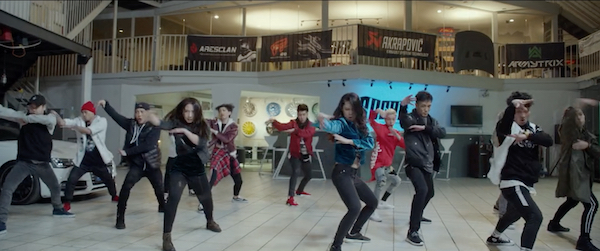
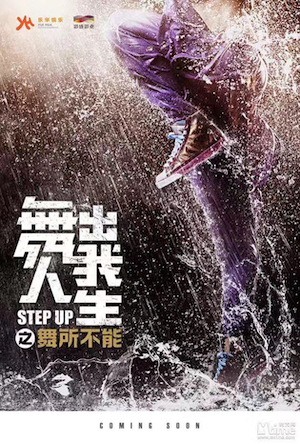 I’m not trying to use that as a selling point, like, “Hey, you should like this, because it’s really an action movie!” I’m merely presenting evidence of how closely related these two genres are. YEAR OF THE DANCE is still very much entrenched in the tropes and melodrama specific to this type of dance movie, so you need to get a kick out of that stuff to enjoy it. I do.
I’m not trying to use that as a selling point, like, “Hey, you should like this, because it’s really an action movie!” I’m merely presenting evidence of how closely related these two genres are. YEAR OF THE DANCE is still very much entrenched in the tropes and melodrama specific to this type of dance movie, so you need to get a kick out of that stuff to enjoy it. I do.
The story centers on a tenuous partnership between two Beijing dancers from different socioeconomic backgrounds. First we meet Tie Hou (SuperDino), narrating onstage before the battle that will end the movie. Like Dewey Cox he has to think about at least part of his life before he performs, so it literally rewinds to when he was in prison, thinking about how he got there. Two years earlier, while dancing with his crush Xiao Fe (Meiqi Meng, JADE DYNASTY), nickname Little Sister, and preparing to tell her about his feelings toward her, he got in a fight with some dudes, breaking glasses and bottles on them. Black and white clips of the fight are intercut with him in his cell, reinterpreting the fight moves as a solo dance. It’s a thrilling conceit that also explains why he doesn’t need to shake off any dance cobwebs when he’s released, goes right back to the club where it happened, and reunites with his friends the Iron Crew.
Sadly, Little Sister doesn’t seem to have forgiven him.
Next we meet He Chuan (Bobo), a member of the Black Tigers dance crew, who are auditioning for a major international competition while dressed in Michael Jackson’s sky blue shirt and white pinstriped suit from “Smooth Criminal” (but minus the hat – what the fuck is the thinking there?). During the routine, another dancer named Dai (K-pop star Kim Sung-joo) “accidentally” kicks He Chuan hard in the leg, badly injuring him and knocking him to the side of the stage. The others just keep going and the judges don’t say anything.
They give trophies to both Dai and He Chuan, but Dai reveals that He Chuan’s rich industrialist dad paid the judges off to give him his trophy. Humiliating. So he ditches the trophy.
Next we see He Chuan, dressed nice, walking with a cane, reluctantly accepting a job managing a construction site for his dad. Dad hopes the fake trophy will be “closure” so the kid can forget about dancing, concentrate on his career and getting an MBA from USC. Will dad eventually see him dance, realize how great he is at it, and decide to support him following his dream? Yes. Will it successfully pull on my heartstrings even though I predicted it instantly? Also yes.
Meanwhile Tie Hou tries to readjust to living on the outside. His brother (?) Tie She suggests avoiding the garage where they used to work together so he doesn’t run into the guys from the fight. In a montage we see his new jobs: giving dance lessons to little girls and to strippers, and working construction, where on his break he puts on headphones and starts dancing.
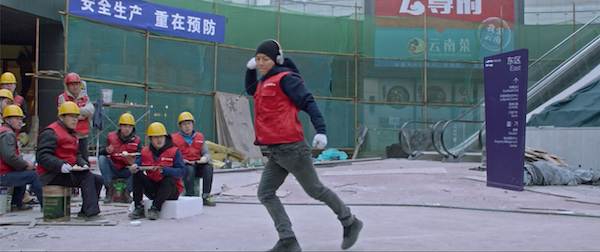
This is, of course, He Chuan’s site, he sees Tie Hou dancing and calls him into the office. Tie Hou expects a warning and instead is invited to join a new dance crew and train to defeat the Black Tigers in the China Regionals and then take on the world’s best crew, Phantom. Assuming the worst of this rich boy, Tie Hou gives him a little soliloquy about how he doesn’t need to escape into dance because he’s probly never experienced hardship or heartbreak, so “we’ll never dance on the same team.”
He Chuan tries to win Tie Hou over by showing up at the Iron Crew’s next battle. An opponent makes a prison rape joke, so Tie Hou pushes him, and gets ejected. He Chuan seizes the moment to, you know, step up as if he’s a member of the crew. He works around his injured leg and incorporates his cane into the dance. At this point I realized I had been won over by this character. You don’t want to root for the poor misunderstood rich boy, but being betrayed and injured gives him some underdog points, and then this dance is cool and his upper class fashion and lanky figure make him an interesting visual contrast to Tie Hou.
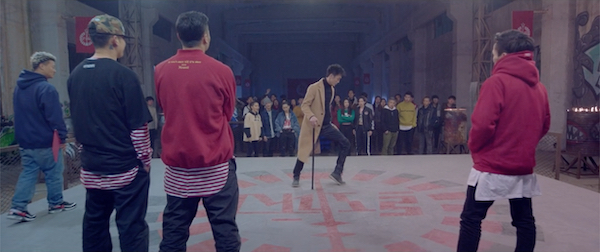
They win the battle, but Tie Hou still rejects He Chuan. Little Sister flirts with him, though, and he later invites her to his birthday party.
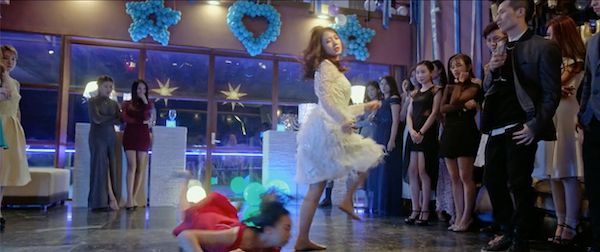
This is a classically STEP UP scene where she comes in feeling out of place, all these cartoonish rich snobs call her a “street bum,” and she shows them up with dance. Later Tie Hou challenges He Chuan. If you win, I’ll join your crew. If I win I never want to see you again. (I thought that was a hilarious thing to say to his boss.) They dance and there’s no prescribed way to determine a winner but Tie Hou seems to grudgingly feel He Chuan proves himself worthy.
So he joins He Chuan’s new crew, Sky Crew. They recruit members of Iron Crew and some other misfits with different styles who he believes can all work together. As usual there are a couple female members who we don’t learn much about but who are the coolest looking people in the crew. It has the enjoyable visual staples of the genre: lots of wild hairdos including braids and bleach and dye, complementary fashion with strategic rips, random studs and buckles, a variety of street wear.
My top two articles of clothing with random-seeming English language slogans on them:
2) The sweatshirt that says “VALENTINE’S DAY”
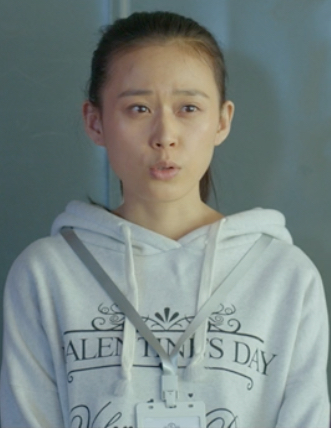
1) The jacket that says “EAT SHIT” on the back in Old English font that somebody wears to a funeral
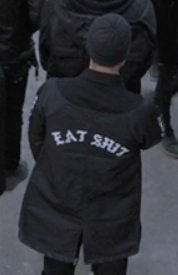
Like every good dance and fight movie we get lots of training montages, in this case with some fight moves as well as dancing. There’s practicing on a rooftop (you always want some of that), on an outdoor basketball court, and where they work (a small clothing boutique, a barbershop, on the street while grilling kebabs).

And like every good dance and fight movie the dances and fights take place in a few different locations – a street, a garage, a sports car show room, different battle venues (a graffitied garage with chain link fences and flaming barrels, an auditorium with giant stage and lights).
It has a clean video look to it that to me looks cheaper than the American STEP UPs, but otherwise Yuan and cinematographer L.T. Chang live up to the challenge – knowing how to shoot fights, they know how to shoot dance. The fight choreographer is Zack Roberts, supervising (dance) choreographers are Will “Wildabeast” Adams and Janelle Ginestra (an actress in SOLDIER!). Ginestra also dances as a member of Phantom, the crew from Los Angeles everybody wants to challenge.
The Sky Crew train and dance hard, but when they go head to head with the Black Tigers they lose. (Somebody says it was rigged, but offers no evidence, so that’s some 2020 election shit, I’m afraid.) Luckily they come up with a plan to make videos combining dance with kung fu. After a going-viral/moving-up-the-charts montage (another preposterous convention I love in these movies) they’ve become so popular that the promoters decide it would be profitable to invite them to the big battle.
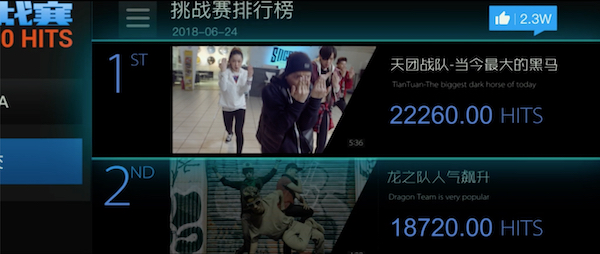
But the notoriety gets them on TV, so the gang that Tie Hou went to prison for fighting realize he’s out and show up at the garage to challenge him to a fight. For his protection, Tie She doesn’t tell him about it and fights them by himself using a wrench and pipes (the biggest martial arts scene in the movie). Tie Hou figures out what’s happening and shows up in time to help win the fight, but (SPOILER) Tie She has been slashed by a razor and uses his dying words to tell Tie Hou to let the feud die with him but to reunite the Sky Crew and “keep fighting” with dance.
Can you believe it – a STEP UP movie with a body count? If I didn’t know better I’d say this was an example of those tonal shifts they get away with in Asian cinema much more than in Hollywood. But I do know better, so I know that this is pretty much the same point in the story as in the original STEP UP when Tyler (Channing Tatum)’s best friend’s little brother Skinny was killed by a rival. They’re going back to the origins.
What the original STEP UP does not have is a title card at the end assuring that the gang were convicted for assault and did time. For me this was the biggest laugh in YEAR OF THE DANCE, not just because it’s such an awkward government-mandated movie convention, but because it was the first time I realized the gang leader was named “Chipmunk.”

When the competition was whittled down to Sky Crew and Phantom I was torn, because Sky Crew were my guys, but how could I root against America? I couldn’t. But there’s a satisfying outcome. Something I always like but don’t always get in dance movies is good sportsmanship (or dancemanship as I call it). Sometimes the losers of a battle get mad and storm off, and it’s so embarrassing. But here, after a winner is chosen, they show each other respect and they hug. Even Dai, when eliminated in the semi-finals, doesn’t throw a fit, and gives He Chuan a tiny nod that could arguably be a sign of respect. Dance brotherhood.
 One thing I would’ve loved but that I knew wasn’t in the cards was some sort of direct connection to the other STEP UP movies. An obvious way would be if Tatum as Tyler (protagonist of part 1 and guest star of part 2, at which point he’s supposed to be a world famous dancer) was in Phantom or was a judge or commentator. Maybe even more exciting would be for parts 2-5 MVP Moose to have a little comedy cameo where he’s a tourist in Beijing involved in a few minutes of hijinks, like Jackie Chan’s scene in SUPERCOP 2, except funny.
One thing I would’ve loved but that I knew wasn’t in the cards was some sort of direct connection to the other STEP UP movies. An obvious way would be if Tatum as Tyler (protagonist of part 1 and guest star of part 2, at which point he’s supposed to be a world famous dancer) was in Phantom or was a judge or commentator. Maybe even more exciting would be for parts 2-5 MVP Moose to have a little comedy cameo where he’s a tourist in Beijing involved in a few minutes of hijinks, like Jackie Chan’s scene in SUPERCOP 2, except funny.
I can see why those didn’t happen, but a more subtle way to do it would be if the American team were one of the crews we’d seen in a competition at some point in the series. Not main characters but just somebody that somebody faced in some round at some point. That’s not the case either, but one dancer, Jade Chynoweth, did appear in the Youtube series Step Up: High Water. I haven’t seen that yet, but when I do I’m gonna try my hardest to interpret her as the same character. (She also played 13-year old Artemisia in 300: RISE OF AN EMPIRE!)
If you’re looking for any possible propaganda in the Chinese STEP UP, you might notice He Chuan encouraging these people specifically known for their individualistic styles to unify in order to win and represent China. That might even be the meaning of the scene where Tie Hou treats himself to some new shoes and then is sad but doesn’t say anything when He Chuan buys the whole team matching shoes. (Tie Hou’s were definitely cooler.) But individuals working as one is required of any dance crew doing choreographed routines together, so don’t let your anti-commie aunts and uncles find out about it, or FOOTLOOSE laws will become part of the GOP agenda. Anyway, if that was supposed to be a lesson, what does it say that (SPOILER) the Chinese team still loses against the American team, who are never played as bad guys, even temporarily? I suspect they would’ve been portrayed differently if the director and half of the producers weren’t American.
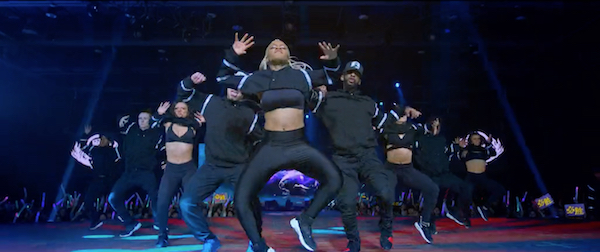
Since the rest of the STEP UP series had such a fun time building a FAST & FURIOUS style roster of returning and intersecting characters, this can’t help but feel separate, more like BEAT THE WORLD, the standalone dance movie that was released in the U.S. as YOU GOT SERVED part 2. But that’s okay. It’s still a good rendition of the formula with lots of great dancing, the right kind of corniness, and the novelty of showing how the joyful expression of dance and dance movies connect regions and cultures all across the globe. I hope other countries get to have their own STEP UPs.
The post Step Up: Year of the Dance (a.k.a. Step Up China) first appeared on VERN'S REVIEWS on the FILMS of CINEMA.
